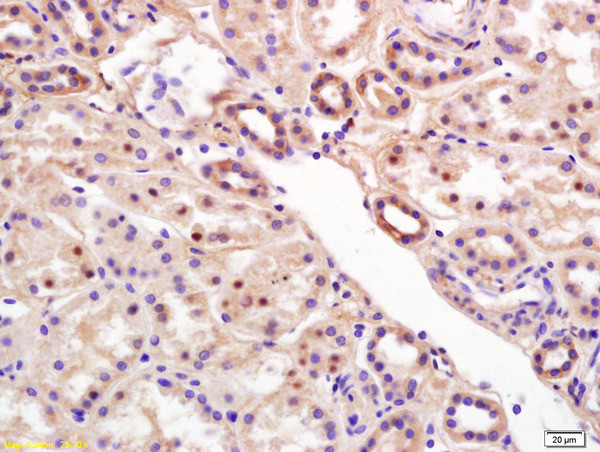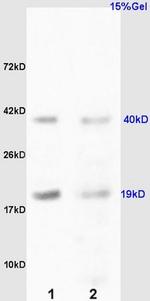Search Thermo Fisher Scientific
Product Details
BS-7827R
Species Reactivity
Host/Isotype
Class
Type
Immunogen
Conjugate
Form
Concentration
Purification
Storage buffer
Contains
Storage conditions
Shipping conditions
Target Information
RCL was identified on the basis of its stimulation by c-Myc protein. The latter is a transcription factor that participates in the regulation of cell proliferation, differentiation, and apoptosis. The exact function of this gene is not known but studies in rat suggest a role in cellular proliferation and c-Myc-mediated transformation.
For Research Use Only. Not for use in diagnostic procedures. Not for resale without express authorization.
References (0)
Bioinformatics
Protein Aliases: 2'-deoxynucleoside 5'-phosphate N-hydrolase 1; 2'-deoxynucleoside 5'-phosphate N-hydrolase 1 {ECO:0000255|HAMAP-Rule:MF_03036}; 5-hydroxymethyl-dUMP N-hydrolase; c-Myc-responsive protein RCL; c-Myc-responsive protein Rcl {ECO:0000255|HAMAP-Rule:MF_03036}; Deoxyribonucleoside 5'-monophosphate N-glycosidase; DNPH1; Nucleoside 2-deoxyribosyltransferase domain containing protein RGD620382; putative c-Myc-responsive; RP3-330M21.3
Gene Aliases: C6orf108; C76683; dJ330M21.3; DNPH1; RCL; RGD620382
UniProt ID: (Human) O43598, (Mouse) Q80VJ3, (Rat) O35820
Entrez Gene ID: (Human) 10591, (Mouse) 381101, (Rat) 171047

Performance Guarantee
If an Invitrogen™ antibody doesn't perform as described on our website or datasheet,we'll replace the product at no cost to you, or provide you with a credit for a future purchase.*
Learn more
We're here to help
Get expert recommendations for common problems or connect directly with an on staff expert for technical assistance related to applications, equipment and general product use.
Contact tech support


